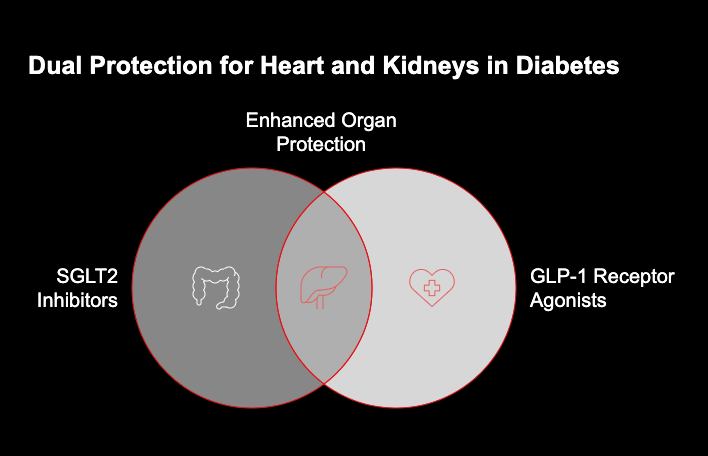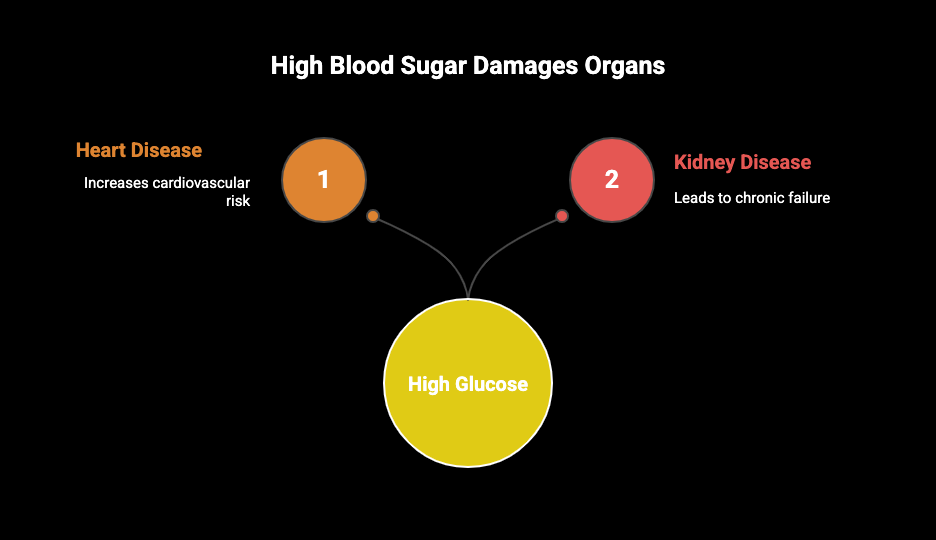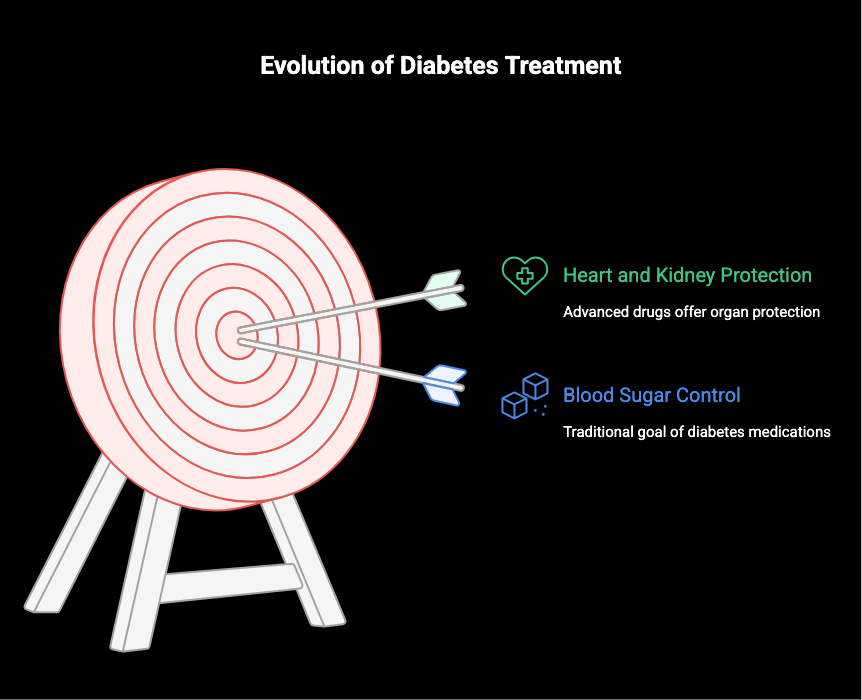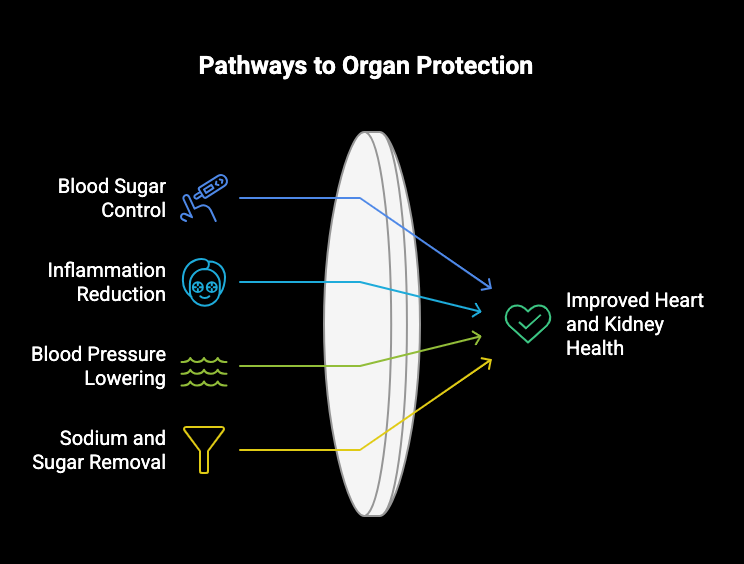
Key Highlights
- Newer diabetes medications now offer protection against heart and kidney disease.
- SGLT2 inhibitors and GLP-1 receptor agonists are two key classes of these advanced drugs.
- Recent FDA approvals, like Ozempic for kidney protection, highlight these added benefits.
- Using SGLT2 inhibitors and GLP-1 receptor agonists together may offer even greater heart and kidney protection.
- Specific drugs like Farxiga have been shown to prevent the progression of kidney disease and heart failure.
- These medications go beyond managing blood sugar to provide comprehensive organ defense.

Introduction
Living with diabetes means managing more than just your blood sugar. It also involves protecting your vital organs. The connection between diabetes, heart disease, and kidney disease is significant, but there’s good news. Modern diabetes medications have evolved, offering powerful benefits that go beyond glucose control. These newer treatments are designed to actively shield your heart and kidneys, marking a major step forward in managing the long-term effects of diabetes and improving your overall health.
Understanding the Connection Between Diabetes, Heart, and Kidney Health
Diabetes can have a widespread impact on your body, and your heart and kidneys are particularly vulnerable. High blood sugar levels can damage blood vessels and nerves that are crucial for proper organ function. This damage increases your risk for serious conditions like cardiovascular disease, heart failure, and chronic kidney disease (CKD).How Diabetes Affects Your Heart and Kidneys.

Why Protecting These Organs Matters for People with Diabetes
Taking steps to protect your heart and kidneys is one of the most important things you can do to maintain your quality of life with diabetes. Since heart disease is a leading complication of diabetes, proactive care can significantly lower your risk of a heart attack or other serious cardiovascular events. Healthy organs mean a healthier you.
Advances in Diabetes Medications with Heart and Kidney Protection
The world of diabetes treatment is experiencing a remarkable transformation. For years, the main goal of diabetes medications was simply to lower blood sugar. Now, a new generation of drugs does that and so much more. These advanced medications are specifically designed to provide heart and kidney protection.

Recent FDA Approvals and 2025 Breakthroughs in the United States
The U.S. Food and Drug Administration (FDA) has been recognizing the dual benefits of these new diabetes medications with recent approvals. A major headline was the January 2025 FDA approval for Ozempic (semaglutide), which is now recognized for its kidney protection benefits in people with Type 2 diabetes and chronic kidney disease. This came after the FLOW clinical trial showed it reduced major kidney disease events by 24%.
What Sets These Next-Generation Drugs Apart from Older Treatments
So, what makes these next-generation drugs so special? Unlike older treatments that focused almost exclusively on lowering blood sugar levels, these new medications work through multiple pathways to protect your organs directly. They offer benefits that are independent of their glucose-lowering effects.
For example, they can help reduce inflammation, lower blood pressure, and remove excess sodium and sugar from the body. This comprehensive approach leads to better clinical outcomes for heart and kidney health. A comprehensive assessment of clinical outcomes has shown that these drugs actively reduce the risk of heart failure and preserve kidney function over time.

Top Diabetes Medications That Support Heart and Kidney Health
When discussing diabetes medications that protect your organs, two classes of drugs consistently stand out: SGLT2 inhibitors and GLP-1 receptor agonists. These treatments have revolutionized how doctors approach diabetes management, especially for individuals at high risk for cardiovascular disease or kidney disease.
Potential Added Benefits of Combining SGLT2 Inhibitors and GLP-1 RAs
Yes, combining diabetes drugs like SGLT2 inhibitors and GLP-1 receptor agonists appears to offer better protection. A recent meta-analysis published in The Lancet Diabetes & Endocrinology found that the benefits of SGLT2 inhibitors on heart and kidney health were consistent even in patients already taking a GLP-1 RA. This suggests their protective effects are additive.
Clinical Associate Professor Brendon Neuen, lead author of the paper, stated, “SGLT2 inhibitors have clear protective effects against heart failure and chronic kidney disease, while GLP-1 receptor agonists can reduce the risk of heart attack, stroke, and also kidney disease.” [1] This highlights how their distinct mechanisms work together.
Conclusion
- In conclusion, understanding the latest advancements in diabetes medications is crucial for anyone living with this condition. By prioritizing heart and kidney health, patients can significantly improve their overall well-being. SGLT2 inhibitors and GLP-1 receptor agonists are leading the way in protecting these vital organs while managing diabetes effectively. With the emergence of combination therapies and innovative drugs like Farxiga, there’s a promising horizon for diabetes management that also addresses cardiovascular and renal health. If you want to learn more about how these medications could benefit you, don’t hesitate to reach out and schedule a free consultation with our experts. Your health journey matters, and we’re here to support you every step of the way!
Frequently Asked Questions (FAQ)
Curious about how diabetes medications can impact heart and kidney health? Many people wonder about the various classes of drugs available and their potential side effects. Questions often arise regarding blood sugar levels and the risk of heart disease or kidney disease progression. Understanding the benefits of these medications, including their role in improving cardiovascular and kidney function, is crucial. Always consult with your healthcare provider to assess your individual needs, ensuring the best approach for your health journey.
Which new diabetes medications in 2025 are recommended for people at risk for heart or kidney problems?
For those with heart or kidney risk, the leading diabetes medications recommended in 2025 are SGLT2 inhibitors like Farxiga and Jardiance, and GLP-1 receptor agonists like Ozempic and Trulicity. These drugs are specifically recognized for their ability to protect against heart disease and slow the progression of kidney disease.
How do diabetes medications help protect against kidney inflammation?
Newer diabetes medications like SGLT2 inhibitors and GLP-1 receptor agonists help protect against kidney inflammation through several pathways. They lower blood sugar and blood pressure, which reduces stress on the kidneys. Researchers also believe they have direct anti-inflammatory effects on the kidney’s blood vessels, further preserving kidney function.
Is it safe to combine different types of diabetes drugs for better organ protection?
Yes, combining SGLT2 inhibitors and GLP-1 receptor agonists is considered safe and effective for enhancing heart protection and kidney health. Major studies have shown that using them together offers additional benefits without creating new safety concerns or significant side effects, though you should always consult your doctor.


